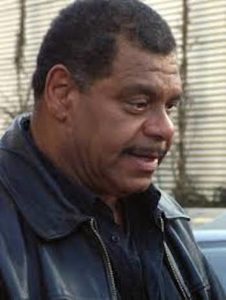
Günther Kaufmann
*Günther Kaufmann was born on this date in 1947. He was a Black German Gay actor.
Born in Munich, Germany, Kaufmann's Black GI father, whom he never knew, returned to the US before he was born. Some Germans call him a "Besatzungskind," one of the many children born between 1945 and 1949 due to relationships between German women and American soldiers. Global Filmgoers familiar with the work of Rainer Werner Fassbinder will certainly know Günther Kaufmann.
Kaufmann had great and small parts in more than a dozen movies directed by prolific German filmmakers. According to Fassbinder: "Günther thinks Bavarian, feels Bavarian, and speaks Bavarian. And that's why he gets shocked every morning when he looks in the mirror." Kaufmann, whom Fassbinder always called "my Bavarian negro", played an essential role in his life. They first met in the autumn of 1969 on the set of Volker Schlöndorff's television film Baal, Bertolt Brecht's expressionist play. Fassbinder played the title role of a celebrated anarchic poet, while the 22-year-old Kaufmann, who had previously worked at sea, had a bit part. Fassbinder fell for Kaufmann immediately and cast him in his third feature, Gods of the Plague (1970).
Kurt Raab, the production designer and former lover of Fassbinder, recalled: "We were all attracted to Günther's beautiful body, his radiant sensuality, and his mild manner, which could suddenly turn brutal if he felt offended. Everyone fancied this guy and openly showed it." The film, a homage to Hollywood noir as filtered through the French New Wave, had Kaufmann playing a gangster nicknamed "the Gorilla", who plans to rob a supermarket with an ex-con (Harry Baer, another of Fassbinder's ex-lovers). They are betrayed by the latter's girlfriend (Hanna Schygulla). Kaufmann, who was married with two children, caused Fassbinder no end of suffering by giving himself to the director only in small doses, never speaking of love.
When Fassbinder was offered a chance to shoot in Spain, he dashed off a script for a western called Whity (1971), with Kaufmann in the title role, hoping that separation from his family would make the young man more receptive to his advances. Some of the highly charged atmospheres of the shoot spilled over into this bizarre, sadistic, and playful pastiche in which Kaufmann portrayed an overworked servant until a sexually exploited barmaid (Schygulla) incites him to murder his white masters. In the meantime, Kaufmann was enjoying his new prosperity, with Fassbinder granting his every wish, which included a series of Lamborghinis, which Kaufmann wrecked or sold.
In August 1970, Fassbinder married the singer and actor Ingrid Caven, with Kaufmann acting as best man at the wedding. The gossip was that Fassbinder was using Caven to show Kaufmann that he, too, could have a wife and perhaps even children. Then, seven years away from the director, Kaufmann appeared mainly on TV. Back with Fassbinder, Kaufmann had roles as the chauffeur in In the Year of Thirteen Moons (1978), about the last five days in the life of an unhappy transsexual, as an explosive expert working for a cell of a Berlin terrorist group in The Third Generation (1979); and as American soldiers in The Marriage of Maria Braun (1979), Lola (1981) and Veronika Voss (1982). In addition, he was in seven of the 14 episodes of Fassbinder's TV mini-series Berlin Alexanderplatz (1980) and played the sidekick of Fassbinder's futuristic detective in Wolf Gremm's Kamikaze 1989 (1982).
It seemed only just that Kaufmann should have appeared in Fassbinder's last film, Querelle (1982), based on Jean Genet's 1947 homoerotic novel. Kaufmann was Nono, the brothel owner. After Fassbinder died in 1982, Kaufmann appeared in minor features and TV series. In 2002, he was sentenced to 15 years' imprisonment after he confessed to accidentally killing his tax consultant. He was released after serving three years when the actual perpetrators were found. He said he had lied to protect his third wife, Alexandra, who was terminally ill with cancer at the time, and who was involved in the murder. Kaufmann then continued his career, notably as a villain in the German children's films Vicky the Viking (2009) and Vicky and the Treasure of the Gods (2011). Günther Kaufmann died on May 10, 2012. His son, Davy, and daughter, Eva, survive him.